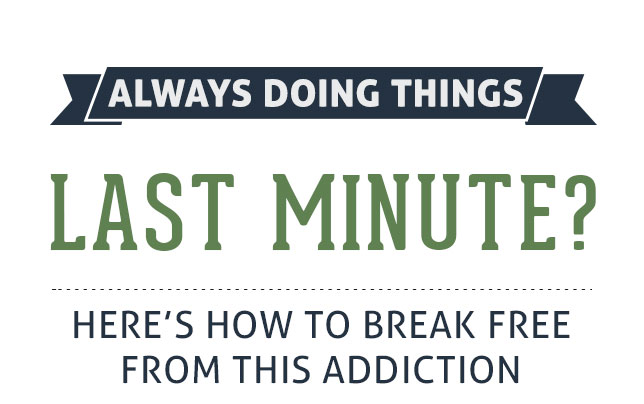There’s a report due to your boss in a week’s time.
You know you should start on it right away, but something else seems so much more interesting.
You tell yourself, “Oh I got 1 week! there’s time enough to get this done.”
So you inevitably end up getting engaged in (less) important things like checking that email and catching up with colleagues.
The week goes by and now there’s just a day left to submit the report. And you know if you don’t come through on time, it’ll affect your appraisals.
This is an emergency. This is Do or Die.
You feel the pressure. You are motivated to take action. Nothing distracts you now.
Your mind is only focused on completing your report.
*Phew* You got the it done just before the deadline.
But you’re left with a feeling that you didn’t really produce your best work because you didn’t have the luxury of going over it a couple of times and straightening out the finer details.
We all know that we can’t give our best if we wait to do things until the very last minute.
Yet we still do it.
An Emergency Forces Productive Behaviour
I got this insight from a David Allen Ted Talk
An emergency forces productive behaviour. Why? Because the situation demands it.
In an emergency situation, the outcome is clear, the next action is clear.
There’s very little thinking involved. There’s only action.
Imagine someone close to you has chest pains. You suspect it’s a heart attack.
Given the circumstances, you’re not going to go on the internet, research the best hospitals & while researching get distracted by what your friend posted on Facebook.
Instead, you’re going to spring into action by rushing the patient to the nearest hospital.
Leaving things to do till the very end may produce productive behaviour, but it’s a very dangerous way to manage commitments.
Your life would be less stressful if you handle things when they show up, instead of when they blow up.
3 Steps to Productive Behaviour without Emergencies
- Do a Mindsweep: Capture what has your attention
- Clarify the Next Action: Ask, what does this mean to you? Is it actionable? If so, then what’s the next action.
- Clarify the Successful outcome: For each actionable item you’ve captured, ask “What’s the successful outcome?”
Why this Works?
Instead of waiting for an emergency to define the “successful outcome” and “next action“, imagine if you defined it when the task showed up. In the case of the report it could be something like:
Successful Outcome:
Submit report on New Real Estate project that will help my team make a confident decision
Next Action:
Research property prices on Google
This will remove the resistance to doing the work.
Because defining the successful outcome, motivates you to reach the goal. And defining the next action tells you exactly what you need to do to move forward.
You’ll no longer rely on an emergency to kick that productivity into overdrive. You won’t need the whip of your bosses’, clients’, spouses’ deadlines to get things done.
Not only would taking action be a breeze, fulfilling your commitments would be absolutely stress-free. Why not revel in that feeling of working hard on something of import without the clock riding your head? It’s a wonderful place to be. Imagine if you did this upfront for ALL our commitments. Your life would be very much Zen!
And because you manage your commitments so well, your boss will be compelled to give you that outstanding appraisal you hoped for. 😉
I believe our work should be an expression of our most creative selves. I work with business owners and their teams to achieve stress-free productivity.

